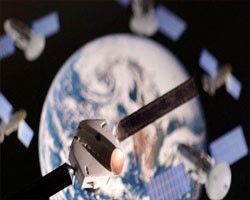SSC Current Affairs
| Science and Technology |
|---|
|
|
|
Why in the news?
Space startups in Japan and India had agreed to jointly study using laser-equipped satellites to remove debris from orbit, an experimental approach to the increasingly imminent problem of orbital congestion. Tokyo-based Orbital Lasers and Indian robotics company InspeCity would study business opportunities for in-space services such as de-orbiting a defunct satellite and extending a spacecraft’s life. What is Space Debris? It is defined as all non-functional, artificial objects, including fragments and elements thereof, in Earth orbit or re-entering into Earth’s atmosphere. Out of 35,150 tracked objects in orbit, only about 25% are working satellites. (United Nations University) Current Status of Space Debris: Space debris: As per ESA's Space Environment Report 2022, over 30,000 pieces of space debris have been recorded and are being tracked on a regular basis by space surveillance networks. Micro debris: It is estimated that there are approximately 200,000 pieces ranging in size from 1 to 10 cm, with millions more smaller than 1 cm. In addition to this, there are about 34,000 objects greater than 10 cm Growth of satellite constellations: There were approximately 6,718 active satellites orbiting the Earth in 2022, an increase of nearly 2,000 satellites in just one year. Concerns related to Space Debris: Threat to space exploration: Debris collisions can disable an operational spacecraft and damage components like optics and solar panels. E.g. collision with a 10-cm object would cause catastrophic fragmentation of a satellite. Kessler syndrome: Uncontrolled growth of debris can lead to self-sustained cascading collisions creating a chain of reactions. Risk to life on Earth: Large space debris that reenter the atmosphere in an uncontrolled way can create risks for the population on the ground. Space pollution: The accumulation of space debris in Earth's orbit contributes to long-term orbital pollution, which not only complicates space activities but also raises environmental concerns for future generations of space explorers. Tensions between countries: With the increased participation of countries in space activities, disagreements may arise over who is responsible for reducing space debris and who is responsible for paying damages when spacecraft from different countries collide. For instance, the United States accused Russia of endangering the ISS following an anti-satellite weapons test. What are the Initiatives to Deal with Space Debris? India: In 2022, ISRO set up the System for Safe and Sustainable Operations Management (IS 4 OM) to continually monitor objects posing collision threats, predict the evolution of space debris, and mitigate the risk posed by space debris. ISRO also carried out 21 collision avoidance manoeuvres of Indian operational space assets in 2022 to avoid collisions with other space objects. ISRO has also set up a Centre for Space Debris Research to monitor and mitigate the threat of space debris. ‘Project NETRA’ is also an early warning system in space to detect debris and other hazards to Indian satellites. Debris-Free Space Missions by Indian space actors by 2030 Global: The Inter-Agency Space Debris Coordination Committee (IADC), an international governmental forum, was established in 1993 to coordinate efforts between spacefaring nations to address the issue of space debris. The United Nations has established the Committee on the Peaceful Uses of Outer Space (COPUOS) to develop guidelines for the long-term sustainability of outer space activities, including the mitigation of space debris. RemoveDEBRIS Mission: for active debris removal (ADR) technology demonstrations. LignoSat: A wooden satellite crafted from magnolia wood to combat space debris. UN Liability Convention (Convention on International Liability for Damage Caused by Space Object), 1972 UN Registration Convention (Convention on Registration of Objects Launched into Outer Space), 1976 The European Space Agency (ESA) has launched the Clean Space initiative, aimed at reducing the amount of space debris and promoting sustainable space activities. |
|
|
|
Useful information for all competitive exams:
Indian Space Research Organisation (ISRO): Formed: 15 August 1969 Preceding agency: INCOSPAR (1962–1969) Headquarters: Bengaluru, Karnataka Chairman: S. Somanath (10th Chairman of the Indian Space Research Organisation) Primary spaceports: Satish Dhawan Space Centre, Thumba Equatorial Rocket Launching Station, Kulasekarapattinam Spaceport Japan Aerospace Exploration Agency (JAXA): Formed: 1 October 2003 Headquarters: Chōfu, Tokyo, Japan Administrator: Hiroshi Yamakawa |
| >> More SSC Current Affairs |
